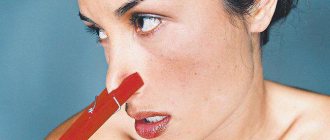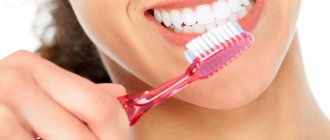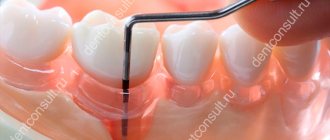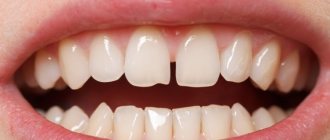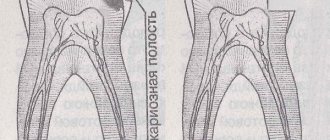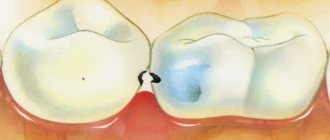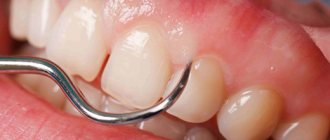The general name for a disease that is characterized by very bad breath is halitosis. Enough common cases are those in which the stench comes from the interdental spaces.
The patient usually notices this problem when using dental floss - it is from it that the unpleasant odor emanates, which is felt by interlocutors and others when communicating with a person.
What is the cause of stench between teeth, how to diagnose the cause and is it possible to treat the disease yourself?
Common causes
There are many causes of halitosis; the main cause can only be determined by a dentist. The most common are:
- Poor oral hygiene. Failure to brush your teeth in a timely manner or the absence of an irrigator and dental floss in your daily care routine results in pieces of food remaining between the teeth. As the particles decompose under the influence of bacteria, they begin to emit a fetid odor of rotting.
- Infectious diseases of teeth and gums . If caries is not treated in a timely manner, processes of tissue decomposition begin inside the tooth, which causes a pungent odor. Stomatitis caused by fungus or periodontal disease also leads to necrosis of oral tissue.
- Smoking and alcohol increase gum disease
- Dry mouth caused by the use of certain medications or regular public speaking.
- Liver and kidney diseases, diabetes mellitus - these diseases are also precursors of unpleasant odor.
If there are no serious health problems, the carious cavities are healed, but the smell on the thread is still present, then the reasons may be the following:
- Poorly installed crowns and dentures . Food can accumulate in the spaces between the gum and the crown, which, if not properly hygienic, causes a stench.
- Accumulated tartar , which is chosen by anaerobic bacteria for their vital activity.
- Long-term use of antibacterial drugs and abuse of pastes and liquids with antibiotic effects.
Most of these problems can be resolved with regular visits to the dentist. To restore the microflora, you need to take medications prescribed by your doctor (Hilak-Forte, Linex-Forte) and increase your fluid intake.
Other reasons for the formation of an unpleasant odor
In addition to the main factors influencing the appearance of unpleasant odor between teeth, there are other reasons that are rare in medical practice.
- For example, drying of the oral mucosa, which occurs due to constant breathing through the mouth. Not every person can be exposed to this, even if they constantly breathe like this, but, nevertheless, the problem exists. If the respiratory system is disrupted due to an incorrect position of the nasal septum, a person begins to breathe more often not through the nose. And overdrying, in turn, leads to the formation of deposits on the teeth, causing the formation of dysbacteriosis. And as a result, an unpleasant odor from the gums and teeth.
- Dysfunction of the salivary glands may occur, which begins due to long-term use of medications. Also, people whose professional activities involve constant communication - teachers, lecturers, announcers, lawyers, etc. can also be affected by salivary gland disorders.
- Another cause of bad breathing can be lung cancer, which is also quite rare in medicine. Dentists do not treat such problems; it is necessary to contact specialists in a certain field.
We invite you to familiarize yourself with the Catalog of dental polishing systems – Page 1
Why is halitosis only felt when flossing?
There are two reasons why a patient smells only from the thread::
- The first is poor sensitivity to one’s own “flavors.” It is caused by the fact that the receptors quickly adapt to the constant unpleasant odor produced by one’s own body. A person may not notice that their breath smells bad , but the odor is concentrated on the dental floss - so it is more difficult not to pay attention to it.
- The second reason is that the processes of tissue decomposition have just begun and affect exclusively the interdental space. In this case, only the thread will smell; the smell will not be felt directly from the mouth, or it will remain very weak for some time.
If the process is started, as the disease progresses, not only the floss, but the entire oral cavity will smell. Moreover, it will no longer be possible to ignore the stench.
Particular attention should be paid if traces of pus appear on the threads after cleaning. In this case, it is necessary to consult a doctor as soon as possible, since this symptom indicates the onset of serious diseases - osteomelitis, periodontitis, gingivitis.
If there is no attention to the problem, the teeth may begin to become loose, and inflammatory processes may spread to the entire gum.
Why does the prosthesis smell bad?
Before you figure out what to do and how to eliminate the unpleasant odor from a tooth under a crown, you need to understand why it appears in the first place. Because it depends on the source how best to get rid of the repulsive “aroma”. The reasons for the unpleasant odor from under the crowns may depend both on the behavior of the patient after prosthetics, and on the not very competent actions of dentists (therapist, orthopedist, implantologist), and the low qualifications of the dental technician making the prosthesis1. Let's look at these reasons in more detail.
Crown made of zirconium dioxide - 12,500 rub.
The price includes all manipulations for the manufacture, installation and fitting of the crown, as well as taking impressions.
Creation of a Prettau zirconium dioxide crown in 1 day, using 3D CAD/CAM modeling technology. Save RUR 5,500 >> Call now or request a call
Working hours: from 9:00 to 21:00 - seven days a week
Patient-specific reasons
The reason why there is an unpleasant odor coming from under the crown may be the patient’s careless attitude towards his teeth – natural and artificial. Often these are the following errors in hygiene or nutrition:
- unsatisfactory or irregular oral hygiene: if you do not remove soft food plaque from the crowns, then it becomes a source of accumulation of microbes. They irritate the gums, leading to inflammation and suppuration. Also, plaque over time transforms into hard stone and “grows” under the gum along the root or implant, causing diseases - periodontitis, peri-implantitis,
- overloading of dentures: when chewing very hard products or objects, the denture may be damaged, the fixing cement may come off, the support (stump) may crack or the pin may break - as a result, bacteria or food particles will penetrate the stump or roots under the crown, which will cause a putrid odor.
Immediately after dentures, a smell from under the tooth crown, caused by the attitude of the person himself, is unlikely to appear. But after many months or even several years, this is the most likely reason. By the way, it is quite likely that the service life of the crown has simply come to an end, and the tooth underneath it has begun to rot due to the fact that its “life span” has also ended - after all, it was once subjected to grinding and removal of the nerve.
One of the reasons why a person feels that there is a strong odor coming from under the crown may be halitosis. Halitosis is a manifestation of any diseases of the internal organs or bad habits of the patient (smoking, love of sweets, fast food), which is expressed by an unpleasant “aroma” from the mouth. Another reason is an allergy to the materials from which the prosthesis is made.
Reasons depending on the doctor
The reasons why there is an odor coming from under the crown related to preparation for prosthetics or the prosthetics themselves are as follows:
- incomplete diagnosis: even before teeth restoration, professionals use X-ray examination to identify hidden pathologies (cysts under the roots, for example). But if the doctor neglected the preparation and did not detect the disease, then some time after the prosthetics the smell of rot under the crown may appear,
- overheating of dentin during grinding of the stump: as a result, caries, pulpitis can occur, and if they are not eliminated, inflammation or neoplasms under the roots,
- the roots were poorly prepared: for example, if violations were made during the removal of the dental nerve, filling the canals,
- the pin/stump is installed incorrectly,
- unclearly taken impressions (casts),
- unsuitable prosthesis: if the edge of the crown is too high, then there is an empty area between it and the gum - microbes penetrate there, causing inflammation of the gums and caries under the prosthesis. If the edge of the crown is very low, then it injures the gums - it scratches it and disrupts metabolic processes. The gums become inflamed or move away from the dentures with the formation of periodontal pockets, where food and bacterial plaque again become clogged,
- low-quality materials for prosthetics,
- incorrect choice of implant: when for a patient with periodontitis and severely inflamed gums a model is selected not with a smooth antibacterial surface, but with a rough one, microbes quickly “stick” to it, causing inflammation,
- the implant was installed with errors: for example, its tip “pierced” the bottom of the nasal sinus and caused sinusitis.
Unlike the previous point, the smell under the dental crown, which arose due to iatrogenic reasons (unintentionally provoked by the doctor), appears quite quickly after prosthetics - literally in a few days or weeks.
Read on the topic: what complications do patients encounter most often after prosthetics - how to detect and eliminate them in time.
Diagnostics
To independently determine the source of the unpleasant odor, you need to check what symptoms of halitosis are present, whether there are:
- in some places pale gums, swelling, film on the teeth;
- redness and pronounced bleeding of the gums, including after flossing;
- the presence of a small amount of pus between the teeth;
- sores on the gums;
- pustules on the tonsils;
- caries.
If you have symptoms, you should visit your dentist . You should definitely see a doctor immediately if your teeth start to hurt, become loose, and your gums bleed. If you suspect kidney or liver disease, consult a physician. The doctor will prescribe primary tests (ultrasound, urine, blood tests) and recommend a specialist.
Very often, diabetes mellitus and kidney failure are characterized by a constant inflammatory process in the body, decreased immunity and impaired oral microflora. To eliminate the unpleasant odor in this case, it is necessary to eliminate the primary disease, paying increased attention to oral hygiene during treatment.
Treating odor at home
Getting rid of an unpleasant odor consists of several stages. They can also become a preventive measure for a pathological condition:
- Oral hygiene. The patient should clean the teeth of plaque every day using toothpaste, floss and mouthwash. It is also necessary to clean your tongue from white coating.
- Diet . More fruits and fresh vegetables are introduced into the diet, refined and industrial products are eliminated, up to 30% proteins.
- Healthy foods . Regular consumption of yogurt, herbs and spices will help with unpleasant odor.
- Drinking regime . To maintain normal functioning of the salivary glands, you need to drink a lot of clean water.
- Application of natural mint . Leaves of the plant, chemical-free lozenges, chewable lozenges with essential substances, and concentrated oil rinses will help maintain fresh breath.
How to get rid of it yourself?
What should you do if you have an unpleasant odor? The first place to start is to ensure good oral hygiene. Choose a high-quality, suitable brush (medium hardness), a toothpaste without an antibacterial effect and an alcohol-free rinse aid. To enhance the effect after each meal :
- use dental floss or irrigator;
- rinse your mouth with water with minimal addition of soda or mouthwash;
- use a toothpick from time to time;
- rinse removable structures after every meal; if you have fixed artificial structures, take care of them as carefully as you would your teeth.
Before going to bed, to relieve inflammation of the gums and throat, floss and rinse your mouth after brushing your teeth. Warm water with soda, infusion of chamomile or sage helps well. If you are prone to stomatitis, regularly use dental gels and soda lotions on problem areas.
Chew a small amount of propolis once a day - it will eliminate inflammatory processes and cleanse the oral cavity of pathogenic microorganisms.
Also, as a daily rinse, you can buy a ready-made propolis tincture at the pharmacy and rinse your mouth twice a day - a teaspoon of the product in a glass of warm water.
Prevention measures
The destruction of a tooth under the crown and the appearance of an unpleasant odor are not always the fault of the patient. But, in most cases, following the rules of oral care after dentures helps to avoid such unpleasant consequences.
Among the main recommendations of doctors are:
- brushing at least twice a day;
- the use of special additional products for thorough cleaning;
- complete nutrition, providing all the necessary nutrients for the body;
- getting rid of bad habits;
- rinsing the mouth with decoctions of medicinal herbs;
- compliance with the drinking regime (at least 2 liters per day);
- Immediately consult a doctor if unpleasant symptoms appear.
Specialty stores sell a wide variety of oral hygiene devices. It's easy to get confused in such an assortment.
To care for artificial crowns, doctors advise using the following items:
- long-haired brushes help remove food debris from hard-to-reach places;
- a tuft-shaped brush is specially designed to remove food particles around braces and crowns;
- Dental floss is used to clean between spaces;
- irrigator - a device that uses a stream of water to perfectly clean both hard-to-reach places and between teeth;
- Rinse aids with antibacterial action provide additional protection against the development of caries.
Using different hygiene devices will help keep your teeth clean and reduce the risk of food particles getting into hard-to-reach places. This condition is the main protection against the development of caries.
From the video, find out whether teeth under crowns always deteriorate.
Prevention and an integrated approach to treating the root cause
If none of the recommended solutions eliminates the problem, be sure to visit a dentist:
- cure caries, seal all holes that are the site of bacterial activity and accumulate food particles;
- check the tight fit of artificial structures - crowns and dentures, and, if necessary, adjust them;
- remove plaque and tartar.
Also, on a daily basis, thoroughly brush your teeth, use an irrigator, rinse your mouth with herbal decoctions (chamomile, sage, brewed citrus peels, oak or eucalyptus bark). Avoid dental problems by visiting the dentist annually. When working in public speaking situations, always carry a water bottle with you and increase your fluid intake to avoid dehydration.
Traditional methods
As rinses, it is good to use natural solutions prepared in the form of decoctions of dry herbs and water. Prepare them according to the instructions on the package.
They eliminate bacteria well, do not harm the natural microflora, clean the oral cavity and promote the healing of herbs: oak bark, sage, chamomile, strawberry, wormwood. Tea essential oil, eucalyptus, lemon and grapefruit in the form of aqueous solutions also help against pathology.
The most common cause of odor between teeth is food debris accumulating in the cavities. Sometimes restoring hygiene procedures is enough to eliminate the symptoms of halitosis. In other cases, it is necessary to cure the pathology that caused the unpleasant odor.
Useful video
In the video you will see 10 ways to get rid of bad breath:
We should not forget that the source of the “aroma” is not always directly the spaces between the teeth . The odor may only be noticeable when flossing, but often coated tongue, sore tonsils, or sore throat make the breath feel foul.
Brushing your teeth and rinsing will only give a temporary effect, since the root cause is disturbances in the functioning of internal organs - the liver, kidneys, lymphatic or endocrine systems. To understand the true cause of the problem and find the right solution, you need to see a doctor and get tested.
ᐉ Does caries stink - how to remove the smell from your mouth
There is probably no person on planet Earth who has not heard about periodontal disease such as caries.
Today, this disease is considered one of the most common dental diseases throughout the world, regardless of the person’s age, gender, geographic location or social status.
Almost everyone has gone to the dental clinic at least once with caries. What causes it, what are the signs of its appearance, does caries stink, classification - you will learn about all this in the article.
How does tooth decay occur?
Even the healers of the ancient world knew what caries was. Translated from Latin, “caries” means “rotting.” Somewhat earlier, damage to hard bone tissue was called osteomyelitis. This is a disease that affects hard dental tissues and leads to thinning of the enamel, followed by softening of dentin and resulting in the formation of a lesion in the form of a carious cavity.
In ancient times, healers assumed that the disease affected the teeth due to the effects of “bad juices” that remain after eating. However, many years of research into the etiology of the disease have fully proven that the main cause of the disease is dental plaque and its microflora.
What contributes to its occurrence?
For many people, for a long time it remained a mystery that not everyone gets caries, although all people have teeth and eat. Research has proven that the development of carious lesions depends on a whole range of factors:
- features of diet and metabolism;
- oral hygiene;
- diseases of internal organs;
- heredity;
- bad habits;
- geographical factor;
- anatomical structure;
- age.
Proper nutrition is not only about the health of the whole body, but also about healthy teeth. A diet that is excessively loaded with carbohydrates leads to a deficiency of much-needed protein for strong, healthy teeth. Salty, spicy and sweet foods are especially affected.
Poor oral hygiene contributes to the accumulation of microbes and the formation of plaque. Particularly susceptible are teeth with flask-shaped fissures, where there is an excellent place for the formation of dental plaque, so caries provokes bad breath. You need to brush your teeth daily and thoroughly so that food residues do not remain in the recesses and interdental spaces.
Diseases of internal organs and heredity acquired during intrauterine development also affect the mineralization of tooth enamel and its resistance to an aggressive environment.
Smoking, regular consumption of strong coffee or tea, and sweet carbonated drinks only worsen the situation, as the formation of the pellicle, i.e., the organic protective layer on the teeth, is disrupted.
Geographical location determines the presence of certain minerals in drinking water. The occurrence of carious lesions directly depends on the fluoride content in drinking water.
Age also plays an important role. Caries especially actively affects baby teeth in children starting from two years of age. The greatest peak is reached at the age of 11 years, and only after 40 years of age a decrease in activity is observed.
Signs of the disease
As a rule, it is almost impossible for us, an ordinary person without medical education, to diagnose the presence of developing caries. However, the presence of at least one of the following manifestations is the first signal to go to the dental clinic:
- Blackening and change in the natural color of tooth enamel. In the initial stage, carious lesions lead to decalcification of the enamel, which is expressed in the appearance of darkening, chalky spots and grooves on the surface of the tooth. It is very simple to treat caries at the initial stage, since in most cases it will be sufficient to carry out a fluoridation procedure.
- Formation of cavitations. Aching pain that stops when rinsed with a warm solution, and “holes” that can be felt with the tongue are clear signs of the disease.
- Dentin destruction. In the acute form of the disease, when examined with a probe, the patient feels sharp pain. If treatment is not started, the tooth will gradually crumble, while the edges of the chipped enamel will be sharp and can injure soft tissues when biting.
- The appearance of a reaction to cold and hot indicates a deep degree of caries damage, since pain occurs due to the penetration of liquid through the tubes into the deep layers of dentin. The pulp nerve transmits the signal to the brain, and you end up feeling pain.
Note: Caries is a bad breath that occurs due to rotting food debris that gets clogged into carious cavities.
Therefore, caries does not “smell” very pleasantly, even though you brush your teeth thoroughly every day, but the smell remains.
Pulpitis is the deepest degree of the disease, when the pulp, where the nerves and blood vessels are concentrated, is affected. Therefore, even a light touch to a damaged tooth causes acute pain.
How is caries classified?
Classification of caries is carried out according to a number of indicators. Often, dentists simultaneously use several terms from different types of classification to determine the type of carious lesion.
According to the degree of the affected area, it is:
- single (one focus);
- multiple (several teeth are affected at once).
According to the nature of the disease:
- acute form (rapid appearance of lesions on several teeth);
- chronic form (long-term slow tooth decay, accompanied by darkening of the enamel);
- “blooming” caries (multiple black dots in different places and on different teeth);
- recurrent (when the disease occurs under and around fillings).
The Black classification is most often used by dentists, since here the location and depth of tooth damage is most clearly defined.
How to remove an unpleasant odor?
You know why tooth decay stinks. To get rid of an unpleasant odor, you cannot do without a visit to the dental office. After the necessary treatment, it is necessary to adhere to the procedure of saturating the tooth enamel with fluoride and calcium. To do this, you must perform the following procedures:
- Brush your teeth well.
- Remove moisture from the tooth surface with a cotton swab.
- Soak a cotton swab with a special solution and apply it to the location of the source of the unpleasant odor.
If you carry out this procedure once every day for 30 days, then you will definitely forget that caries stinks.
Proper nutrition, proper oral hygiene, timely preventive examinations at the dentist and, perhaps, you will not encounter such problems as caries, bad breath, fillings and tooth extraction.
on this topic
- Why does a tooth hurt after filling?
- If your tooth hurts
Source: https://anZub.ru/lechenie-zubov/vonyaet-li-karies/
How to recognize the disease by accompanying symptoms
An unpleasant odor from under the crown of a tooth is often accompanied by various additional symptoms. A person may experience one or more of the following symptoms, which occur with varying frequency and strength. Moreover, accompanying symptoms may appear both before the “amber” begins to be felt from under the prosthesis, and after. What you need to pay close attention to, consider in the following list:
- the prosthesis has become mobile: the crown or bridge has begun to move, wobble,
- the prosthesis is broken: it may be a chipped piece or a large crack,
- pain appears: for example, when closing the jaws, while chewing, when eating hot / cold / sour food or drinks, while brushing your teeth, or it may hurt “just because”, i.e. without obvious irritant,
- the gums around the prosthesis changed color: it turned red, turned white, became “cyanotic”,
- the appearance of pus from under the gums, a fistula may form,
- enlargement of the submandibular lymph nodes,
- runny nose, loss of smell (due to sinusitis or sinusitis caused by a bad tooth or implant),
- increased body temperature, headache, weakness,
- numbness of the jaw, tongue,
- sour, sweet or “strange” taste in the mouth,
- galvanic syndrome: the occurrence of an electrical impulse between prostheses with inclusions of dissimilar metals.
“A couple of weeks ago I began to notice that the crown that was placed on a broken tooth 4-5 years ago began to move a little. It seems to be a little at all, and it seemed to me that it was uncritical. But just a few days later, a strange smell appeared from it, then the gums turned red, and the pus was squeezed out. And a week later it just broke off and fell out.”
Ksenia Andreevna, review from gidpozubam.ru
Causes and solutions
If we put together a top list of reasons that cause odor between teeth, it won’t start with terrible gastrointestinal diseases or dental pathologies. The most common cause is gum inflammation. But they can arise as a result of diseases, unhealthy foods, and bad habits.
Gum inflammation
Common diseases that cause inflammation and bad breath as a result of damage to the gum structures are periodontitis and gingivitis. Accompanied by symptoms:
- pain when brushing teeth;
- bleeding, color change to brighter, red;
- swelling around the teeth, inflammation of the tongue;
- the appearance of mobility of the incisors;
- discharge of pus from “pockets” between the teeth and gums.
Dangerous infectious processes require medical intervention. If you try to get rid of the disease yourself, you can speed up the process of its development.
When purulent processes occur, the smell from the mouth and between the teeth becomes distinct and strong. Contact your dentist for therapeutic elimination of the causes of the disease; the doctor will prescribe medications, local creams and gels, and possibly antibiotics. Maintain good hygiene, but don't irritate sore gums with hard brushes.
Deposits on teeth
As a result of poor oral hygiene, uncleanable plaque and tartar appear on the teeth. Because of them, an odor appears between the connected bone tissue, which is clearly noticeable when treating the gums with thread.
In this case, the cause of the smell can only be eliminated in a dental office. The doctor will clean the enamel from stone, prescribe rinses and tell you how to maintain hygiene correctly.
Leftover food stuck between teeth
If the incisors are positioned incorrectly, or there are large or small gaps where hard food can get stuck, an unpleasant odor often occurs between the teeth. If the oral cavity is not sufficiently cleaned using dental floss, toothpaste, and mouthwash, then food particles begin to rot.
As a result, the number of anaerobic bacteria rapidly increases and an odor appears. Doctors recommend brushing your teeth after every meal with a special floss, or even better, using toothpaste. If this is not possible, use chewing gum (no longer than 5-10 minutes).
Acute stage of caries
Bad breath begins to smell if caries develops on one or more teeth. Disease that occurs between the teeth is difficult to diagnose at home. If you notice an unpleasant odor on your dental floss, contact your dentist for advice.
Prosthetic systems as a cause of pathology
When installing crowns or other prostheses, a smell may appear between the teeth if the dentist has violated the technology for attaching the products. So, if one of the parts does not fit well to the gum, voids are formed. Food accumulates in them, bacteria develop, and it is very difficult to manually clean such pockets.
But the cause of odors between teeth can also be insufficient hygiene. To get rid of the pathology, you need to dismantle the prosthesis, replace it or install it better.
Problems with oral microflora
The joints between teeth begin to smell bad as a result of dysbacteriosis. It happens not only in the intestines, but also in any other area where there is a mucous membrane. The reasons are: mouth rinses, toothpastes with chlorhexidine or triclosan. These substances disrupt beneficial flora and destroy important bacteria.
To eliminate the pathology, you need to visit the dentist and tell them about the toothpastes used. If no other causes of halitosis are identified, the doctor recommends medications to restore the microflora.
Tonsillitis
With chronic tonsillitis and other inflammatory processes, an accumulation of bacteria occurs in the tonsils. Exacerbations occur, accompanied by purulent formations, as a result of which the flora migrates to the tongue and gums, and an unpleasant odor appears.
Eliminating infections and treating chronic pathology is the only way to prevent constant relapses. If immunity is low, it is necessary to undergo therapy to restore it.
Dietary features and habits
Poor nutrition, an abundance of chemical additives, excessive amounts of fat and protein - all this leads to disruption of the microflora and also impairs digestion.
Nicotine and alcohol are powerful provocateurs of various pathologies, including dysbiosis in the mouth. Their action worsens the immune system. To solve the problem, give up bad habits, reduce your consumption of spices, coffee, and proteins. Add more green vegetables, cabbage stews, bell peppers.
Gastrointestinal diseases
Pathologies such as gastritis and pancreatitis occur in many residents of megacities. They cause an unpleasant odor between the teeth due to the accumulation of bacteria. To combat the disease, medications and diet are used. If you follow the rules established by the doctor, you can go into remission for a long time.
Elimination of bad breath
Traditional drug therapy includes the following:
- Prescription of drugs to normalize digestion (Mezim, Festal).
- Use of antacids (Almagel).
- Prescription of potent antibacterial drugs to stop the activity of pathogenic bacteria (Amoxicillin, Clarithromycin).
The following tips can be used as an auxiliary treatment:
- It is recommended to rinse your mouth after every meal. You can also chew fragrant mint leaves, parsley or dill seeds.
- Use special mouth rinses based on alcohol and decoctions of medicinal plants. With their help, you can not only freshen your breath, but also quickly eliminate the activity of pathogenic bacteria.
- Enrich your menu with fermented milk products, as they have a beneficial effect on the digestion process.
- Rub baking soda or sea salt into your gums. This method will help eliminate bleeding gums and improve the freshness of your breath.
- Rinse your mouth several times a day with decoctions of medicinal herbs. To do this, you can use chamomile, oak bark, sage and yarrow. These plants should be brewed in a glass of boiling water with 1 tsp. raw materials.
If the smell is a consequence of a disease, it is necessary to undergo diagnostics and begin treatment.

